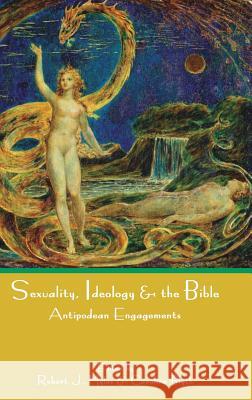Sexuality, Ideology and the Bible: Antipodean Engagements » książka
Sexuality, Ideology and the Bible: Antipodean Engagements
ISBN-13: 9781909697836 / Angielski / Twarda / 2015 / 202 str.
What happens when explorations of sexuality, gender and the Bible go down under? This fascinating collection of essays, written by scholars located in the Antipodes, traverses the highly contested landscapes of sexuality, gender and biblical studies, revealing a myriad of sexual discourses voiced within both the biblical texts and their interpretative traditions. Recognizing that textual meaning is always shaped by the cultural and contextual baggage the reader brings to the interpretative task, contributors raise provocative questions about the meanings, identities and ideologies that surround biblical discourses of sexuality and gender, exploring how these have been and can be reshaped and reconceived. Deane Galbraith examines the theological reflections of Augustine and Paul on Adam's 'perfect penis' in Eden while Roland Boer explores the earthy biblical vocabulary used to depict female genitalia. Christina Petterson, meanwhile, examines the Moravian Brethren's celebration of a Christ who bore on his body male and female genitalia. Travelling beyond the sexualized human body, Emily Colgan considers the problematic language of gender violence against the land that is voiced in Jeremiah. Elaine Wainwright blurs and queers the binary categories of human and non-human in the Sermon on the Mount. Yael Klangwisan continues this blurring of boundaries through her creative reading of Song of Songs. Moving from the gendered body to the gendered voice, Alan Cadwallader probes Paul's rhetorical gender-bending in his 'masculinized' oral culture. Caroline Blyth and Teguh Wijaya Mulya empower Delilah to vocalize her queer potential in both the biblical narrative and popular culture. Gillian Townsley adds her own Kiwi voice to explore queer possibilities in Philippians 4.2-3 in the light of New Zealand's same-sex marriage legislation. The volume concludes with a queer reconsideration of the Antipodes themselves from the perspective of a northern-hemisphere biblical scholar, Hugh Pyper. This compelling collection will make a substantive contribution to the bookshelves of scholars and interested readers in such areas as biblical studies, religion and gender-queer studies.
What happens when explorations of sexuality, gender and the Bible go down under? This fascinating collection of essays, written by scholars located in the Antipodes, traverses the highly contested landscapes of sexuality, gender and biblical studies, revealing a myriad of sexual discourses voiced within both the biblical texts and their interpretative traditions. Recognizing that textual meaning is always shaped by the cultural and contextual baggage the reader brings to the interpretative task, contributors raise provocative questions about the meanings, identities and ideologies that surround biblical discourses of sexuality and gender, exploring how these have been and can be reshaped and reconceived.Deane Galbraith examines the theological reflections of Augustine and Paul on Adams perfect penis in Eden while Roland Boer explores the earthy biblical vocabulary used to depict female genitalia. Christina Petterson, meanwhile, examines the Moravian Brethrens celebration of a Christ who bore on his body male and female genitalia. Travelling beyond the sexualized human body, Emily Colgan considers the problematic language of gender violence against the land that is voiced in Jeremiah. Elaine Wainwright blurs and queers the binary categories of human and non-human in the Sermon on the Mount. Yael Klangwisan continues this blurring of boundaries through her creative reading of Song of Songs.Moving from the gendered body to the gendered voice, Alan Cadwallader probes Pauls rhetorical gender-bending in his masculinized oral culture. Caroline Blyth and Teguh Wijaya Mulya empower Delilah to vocalize her queer potential in both the biblical narrative and popular culture. Gillian Townsley adds her own Kiwi voice to explore queer possibilities in Philippians 4.2-3 in the light of New Zealands same-sex marriage legislation. The volume concludes with a queer reconsideration of the Antipodes themselves from the perspective of a northern-hemisphere biblical scholar, Hugh Pyper.This compelling collection will make a substantive contribution to the bookshelves of scholars and interested readers in such areas as biblical studies, religion and gender-queer studies.











